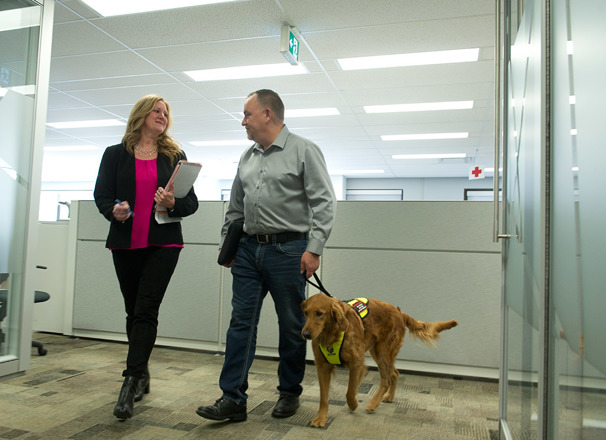Mental health issues in the workplace are far more common than most people realize. And their effects can be profound.
Talking about your mental health can take a lot of courage. But open, honest conversation is crucial.
Talking about mental health issues raises awareness and reduces the stigma around them. It supports inclusivity and productivity. And it improves the well-being of everyone in the workplace.
Mental health in the Canadian workplace
Here are the facts.
- Each year, 1 in 5 Canadians will experience a mental health challenge or illness.
- About half of the population will have or have had a mental illness by the age of 40.
- 41% of Canadians have experienced a decline in their mental health since the start of the pandemic.
- In the last 5 years, 38% of Canadian workers took time off as a result of mental health issues.
- Nearly half of these workers were off for a month or more. The average number of days absent for mental health reasons was 12.
- Absenteeism and disability resulting from mental health issues cost the Canadian economy $50 billion per year.
Talking about your mental health issues
Workers who are dealing with a mental health issue report difficulty concentrating, making decisions, handling challenging work, and completing tasks on time. Simply trying to power through instead of taking a break is not a solution. In terms of lost productivity, the cost of mental-health-related “presenteeism” (working while unwell) can be more than 3 times higher than the cost of time away.
Still, raising the topic with your employer can be hard—for a lot of reasons. Mental health is a deeply personal issue. You may feel uncomfortable sharing intimate details about your life, especially in a workplace setting. You may fear you will be labelled, perceived as unfit for your job, or treated differently by co-workers.
If you’re thinking about discussing a mental health issue with your employer, here are some steps to consider.
1. Understand your situation
The first step is to try to understand what you’re experiencing and how it’s affecting you. For many people, this will involve talking to a doctor or mental health professional.
The terms mental health and mental illness are often used interchangeably, but they mean different things.
Mental health
Like physical health, mental health refers to a state of well-being. Mental health is more than just the absence of an illness or disorder. It’s your ability to function, connect with people, and manage your thoughts and feelings.
Your mental health can be affected by day-to-day life. For example, you may experience loneliness, physical illness, a breakup, a job loss, or a death in the family. Challenges like these can trigger unhappiness, anxiety, or stress. And they can make it hard for you to perform at your best.
Tip:
To check your mental health, try some online self-assessments like the Mental Health Meter or Checkup From the Neck Up.
Mental illness
Mental illness is often diagnosed by a health-care professional. Types of mental illness include:
- Depression or bipolar disorder
- Anxiety disorders
- Eating disorders
- Personality disorders
- Substance abuse and gambling disorders
- Post-traumatic stress disorder
Mental illness usually affects a person for a long period of time. However, someone with a mental illness can have long periods of good mental health.
2. Decide whether to disclose
Before you tell your employer about a mental health issue, think about your reasons for doing so. And consider the pros and cons:
- Why do you want to talk about your mental health?
- What do you hope to gain by disclosing?
- For example, are you looking for temporary support? Long-term accommodation? Information on what support is available? Are your goals reasonable?
- Could you access support outside of work?
- How does your workplace deal with disabilities, inclusivity, and accommodations? What is the culture? What are the policies?
- Do you see any potential drawbacks to disclosing?
- Would disclosing feel like a relief?
- Who would you like to share your situation with? And who would you rather not tell?
- For example, if you don’t think your manager would be supportive, consider speaking with someone in HR.
Take the time to think things through. Then decide whether it makes sense for you to disclose—and whether you’re ready.
3. Learn your rights
In Alberta, human rights legislation protects employees experiencing mental health issues.
Employers have a duty to accommodate employees with all types of disabilities, including mental health disorders. This means you can’t be fired for disclosing a mental illness. It also means your employer must make reasonable changes to your work environment to help you do your job. For example:
- If you have a mobility issue, your employer may need to make your workplace wheelchair accessible.
- If you have a mental illness, your employer may need to adjust your schedule so you can go to your medical appointments.
Tip:
For more information on your rights under the law, consult the Alberta Human Rights Commission and the Canadian Human Rights Commission.
4. Plan what you’re going to say
Decide what you’re willing to share
What you tell your employer about your mental health issues will depend on your goals. And your comfort level.
Here are some things to consider:
- If you have a diagnosis, you don’t have to disclose it. However, a health-care professional may need to provide documentation that lists the special accommodations you need.
- The people you talk to may be uninformed about mental health. Be prepared to help them understand what your situation means and what you need.
- Be open to questions. But don’t feel you need to answer every question. It’s OK to say, “I don’t feel comfortable sharing that.”
- Keep the conversation constructive. Avoid oversharing about your personal life or complaining about work.
Come prepared with specific requests
Do some research beforehand. And when you meet with your employer, be clear in asking for what you need.
Here are some examples of the kind of temporary or longer-term accommodations you might need and how to ask for them:
- Flexible scheduling
- “Sometimes my depression makes it really challenging to get started in the morning. Would it be possible for me to start work an hour later and stay an hour later in the evening on those days?”
- Changes in how you interact with others
- “A family member recently passed away, and talking to clients is especially draining right now. Could I focus on back-end tasks until I’m feeling better? Or work on projects that don’t need face-to-face communication?”
- Modifying workload or duties
- “I’m taking steps to manage my anxiety. But right now multitasking and decision making feel overwhelming. Would it be possible for me to stick to a single, longer-term project instead of many smaller ones?”
- Modifying workspace or changing location
- “I’m going through a big change in my personal life. And I find I can concentrate better in a quiet space. Would it be possible to work remotely for a few days each week until things settle down?”
Tips for getting the help you need:
- Research what kinds of accommodation are possible. The online Job Demands and Accommodation Planning Tool can help identify reasonable accommodations that are tailored to your needs. It’s also a good idea to talk to a health-care professional for suggestions.
- Before you speak to your employer, write out and practise what you want to say.
- Keep a written record of your requests for accommodation.
- Find out what resources you can access through your workplace. For example, many health and benefits plans cover employee assistance programs or counselling.
5. Follow up
Be sure to follow up after meeting with your manager or employer representative. Let them know how it’s going, what’s working, and what’s not working.
Consider scheduling regular follow-up meetings so you and your manager can both prepare for these conversations.
Tips for talking to co-workers:
If you’re dealing with a mental health issue, you’ll want to decide how much to share with co-workers. This is especially important if your employer has made accommodations to help you deal with your situation. Your co-workers may ask questions about your time away. And they may ask about work modifications your employer has made to help you.
It’s helpful to:
- Plan what you’ll say in advance.
- Workplace Strategies for Mental Health offers examples of how to respond to possible questions.
- Let your employer know what you want them to say when co-workers ask why you’re absent from work.
Resources
Remember, if you’re dealing with a mental health issue, help is always available. You can access the following resources for support:





